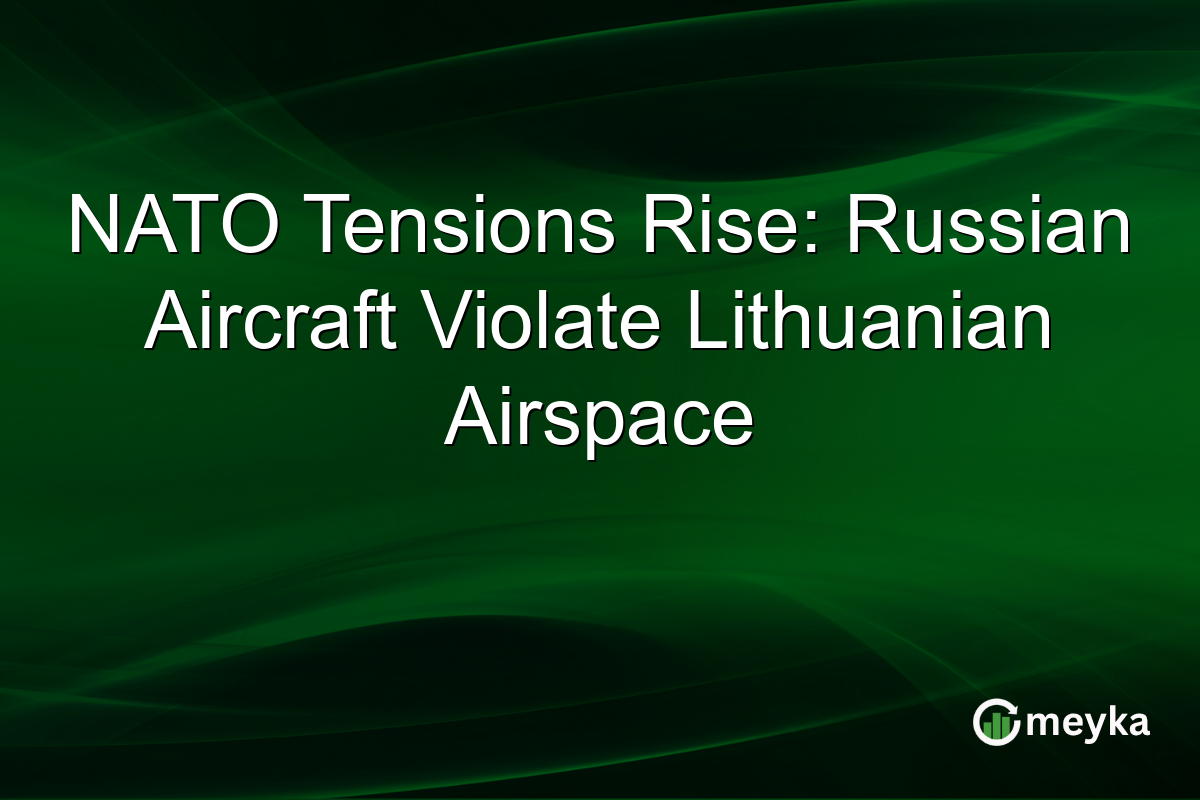NATO Tensions Rise: Russian Aircraft Violate Lithuanian Airspace
The recent breach of Lithuanian airspace by two Russian aircraft—a SU-30 fighter jet and an IL-78 tanker—has heightened tensions in the Baltic region. This incident underscores the fragile state of NATO-Russian relations and highlights the strategic importance of Baltic air defenses. As NATO steps in to address these provocations, it raises questions about the long-term security implications for Lithuania and its neighbors.
The Airspace Violation
On October 20, 2025, Lithuanian airspace was breached by a Russian SU-30 fighter jet and an IL-78 tanker. These aircraft failed to file flight plans and did not communicate with air traffic control. According to Lithuanian officials, this is not an isolated event but part of a worrying trend that jeopardizes Baltic security. This violation wasn’t merely a diplomatic affront but a blatant disregard for international air safety norms.
NATO’s Strategic Response
Following the airspace violation, NATO swiftly deployed fighter jets from a nearby base as part of its Baltic Air Policing mission. The alliance reaffirmed its commitment to safeguarding the region. Secretary General Jens Stoltenberg emphasized, “NATO remains vigilant in defending all member territories.” This response underscores NATO’s strategic posture—deter Russian aggression and reassure Baltic states of their defense commitments. For more details on the NATO statement, visit ZDF Heute.
Implications for Baltic Security
These recurring incursions highlight a critical need: bolstering Lithuania’s air defenses. NATO’s presence, while robust, is not a panacea. Lithuania seeks enhanced integration with NATO systems, including modern surveillance technology and rapid-response capabilities. The incident amplifies existing fears about Russia’s motives, escalating calls for increased military budgets and strategic deployments in the Baltics. This situation mirrors similar provocations in the region, reinforcing the arms buildup predicament along Europe’s eastern front.
Global and Regional Reactions
Internationally, NATO allies expressed unified support for Lithuania. The European Union and United States condemned Russia’s actions as dangerous provocations. Regionally, Baltic states are strengthening defense collaborations. Lithuanian President Gitanas Nausėda stressed the importance of swift and decisive action to maintain regional peace. To view related discussions, visit ORF. These reactions signify a broader geopolitical tension, impacting diplomatic dialogues and strategic alignments.
Final Thoughts
The recent violation of Lithuanian airspace by Russian military aircraft is not just a regional concern but a pivotal moment in NATO-Russian relations. This incident reveals the pressing need for enhanced air defense mechanisms and strategic deterrence in the Baltic region. Both local and international responses will shape future policies, potentially leading to increased military spending and collaboration among Baltic states. As global tensions rise, maintaining vigilance and unity becomes imperative for national and regional security. Hence, NATO’s role in maintaining peace and stability remains crucial, prompting further scrutiny and strategic planning among allied nations.
FAQs
The violation occurred when a Russian SU-30 and IL-78 entered Lithuanian airspace without filing flight plans or contacting air traffic control. This breach is viewed as both a safety risk and a geopolitical provocation.
NATO deployed fighter jets through its Baltic Air Policing mission. The alliance reiterated its commitment to defending member territories and addressing such provocations swiftly.
The incident stresses the need for fortified air defenses in the Baltic region. It accelerates calls for increased military budgets and greater integration with NATO systems among Baltic states.
Baltic states are enhancing defense collaborations, while Europe and the US condemned Russia’s actions. Regional leaders emphasized the necessity of coordinated, timely responses to maintain stability.
This incident intensifies already strained relations, underlining the delicate balance in NATO’s strategic deterrence efforts. Future diplomatic and military strategies will likely be adapted to these evolving tensions.
Disclaimer:
This is for information only, not financial advice. Always do your research.






